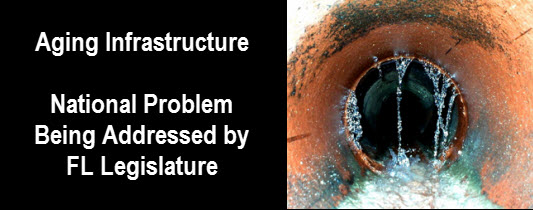FL Legislature: Proposed Wastewater Grant Program Addresses Aging Infrastructure
Posted January 30, 2020 06:35 am

Photo:
Pipelinings Supply
TALLAHASSEE, FL – The House Agriculture & Natural Resources Subcommittee unanimously endorsed a massive water improvements bill that would create a wastewater grant program that utility districts can tap into to upgrade infrastructure and finance sewer installation.
House Bill 1343 also would transfer coordination of the state’s septic-to-sewer conversion program from the Department of Health to the Department of Environmental Protection by 2022 and revise stormwater, sewage treatment, biosolids and agricultural runoff regulations.
The 120-page bill, which now advances to the House Appropriations and State Affairs committees, is the “long overdue” culmination of years of constituent meetings, said sponsor Rep. Bobby Payne, R-Palatka, who authored a similar proposal that idled last year.
“I feel confident we now have the right recipe,” Payne said. “This is an elephant. We eat it one bite at a time.”
The bill is certain to be revised. It shares overlaps with HB 1363, sponsored by Rep. Toby Overdorf, R-Stuart, which the subcommittee also advanced Tuesday, and Senate Bill 712, the Clean Waterways Act, filed by Sen. Debbie Mayfield, R-Melbourne, which awaits a Senate Appropriations Committee hearing before presentation onto the floor.
DEP Secretary Noah Valenstein praised lawmakers for seizing momentum created by Gov. Ron DeSantis in investing in water infrastructure and addressing environmental issues that have lingered for years.
The measures eventually will merge into “a final bill that really makes a difference in Florida,” Valenstein said before referring to lawmakers’ chides about HB 1343's length by saying he found the bill “positive from the first page to the last page.”
The Money
HB 1343’s wastewater grant program allows DEP, in consultation with the state’s five water management districts, to provide grants for projects to reduce nutrient pollution. Half the grant money will be provided by local governments. The other half would require legislative approval, meaning the bill does not dedicate funding but creates a way to get it.
Rep. Kristin Jacobs, D-Coconut Creek, said there’s “super excitement” about the grants, especially in rural areas that “just don’t have the funds” to upgrade water infrastructure.
“The grant provision is really important” she said, “but nothing is going to be more important than finding the funds in future legislatures.”
Mandating cities finance half the grants to meet DEP standards breaks down a “firewall” that allowed some municipalities to defer maintenance, Jacobs said.
“There are many city utilities that now find themselves struggling to find the dollars to stay abreast in maintenance,” she said. “Cities can’t keep stealing dollars from their utilities. (Utilities) know what their needs are but don’t have absolute control” of their budgets.
Among HB 1343’s provisions:
Requires utilities to draft remediation plans for the estimated 2.6 million homes in Florida — housing about 30 percent of state’s population — on septic systems.
Requires DEP and water management districts to update the stormwater regulations, with an emphasis on nutrient reduction.
Requires local governments to create wastewater treatment plans for the state’s 2,000 sewage treatment plants.
Requires DEP to create a real time, publicly accessible water quality monitoring tool.
Requires the Department of Agriculture to inspect farms and citrus groves enrolled in best management practices (BMPs) and commissions the University of Florida to develop new BMPs.
Rep. Rick Roth, R-Palm Beach Gardens, noting it “took two hours to read” HB 1343, said he “very much” supports the bill but is concerned it implies farmers are not doing their part to remedy water quality issues.
“I just want to make sure it is clear that it is not the intent to make this (about) what agriculture is doing to water quality in the state of Florida,” he said.
-------------------------------
This piece appeared in the The Center Square and was reprinted by the Columbia County Observer with permission or license.
Layout and graphics added by the Observer

 By
John Haughey | The Center Square
By
John Haughey | The Center Square